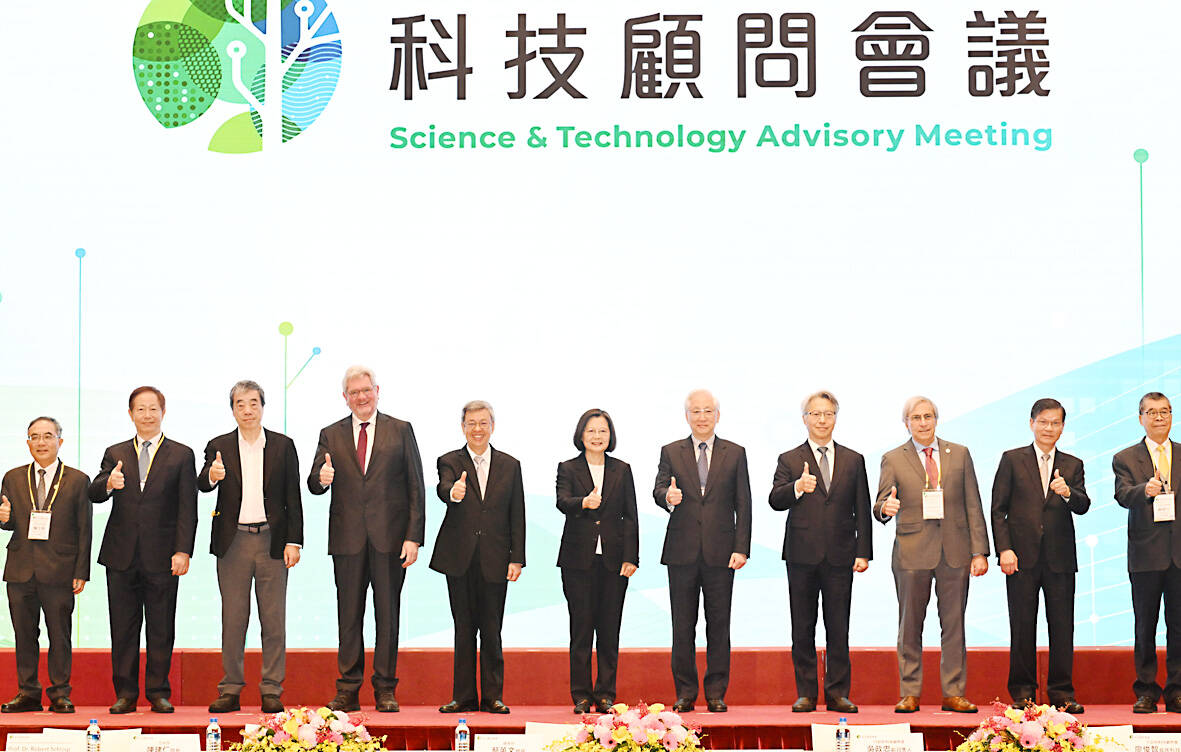The Executive Yuan yesterday resumed a high-level Science and Technology Advisory Board Meeting after a 12-year hiatus, as the government aims to seek recommendations from industry leaders to craft new strategies for the nation to enhance its global competitiveness over the next decade, the National Science and Technology Council (NSTC) said in a statement.
During the 31 meetings held between 1980 and 2011, the government had sought advice from science and technology experts to help build world-class industries from semiconductor and biological technology to information and communications technology, the statement said.
“We are now in an era where science and technology have become synonymous with national strength on a global scale,” President Tsai Ing-wen (蔡英文) said at the meeting in Taipei.

Photo: Tien Yu-hua, Taipei Times
The three-day meeting is to focus on two main themes — green technologies amid the global effort to move toward carbon neutrality and possible mutual enhancement between artificial intelligence (AI) and the semiconductor industry.
Premier Chen Chien-jen (陳建仁) and NSTC Minister Wu Tsung-tsong (吳政忠) are leading the meeting, while Academia Sinica President James Liao (廖俊智) is serving as the top technology adviser.
Meanwhile, Taiwan Semiconductor Manufacturing Co (台積電) chairman Mark Liu (劉德音) and MediaTek Inc chairman Rick Tsai (蔡明介) are among the advisers at this year’s meeting, along with National Taiwan University president Chen Wen-chang (陳文章), US Scripps Research Institute professor Wong Chi-huey (翁啟惠), Harvard University computer science professor Kung Hsiang-tsung (孔祥重).
Taiwan has built a resilient and comprehensive semiconductor supply chain not seen in the rest of the world. To safeguard that technology leadership, the NSTC has proposed spending NT$300 billion (US$9.52 billion) over the next 10 years on fostering semiconductor and AI start-ups, as well as creating bigger talent pools, the council said.
Chen Chien-jen said this year’s meeting would focus on green energy, and the semiconductor and AI technologies that are expected to have a major impact on society and its development in the next 10 to 20 years.
“We expect that the advisers’ professional and visionary advice, based on Taiwan’s own existing advantages, will bolster and ensure the continued prosperity of Taiwan’s tech sector,” he said, adding that next year’s budget for technology development is more than NT$150 billion, up 18 percent from this year.
The second day of the meeting is to focus on the net-zero industry, aiming to make Taiwan a model for the world, the council said.
Over the three days, the group would come up with both medium and long-term technology development strategies with the goal of helping Taiwan achieve the highest technical capabilities, it said.

Taiwan Semiconductor Manufacturing Co (TSMC, 台積電) last week recorded an increase in the number of shareholders to the highest in almost eight months, despite its share price falling 3.38 percent from the previous week, Taiwan Stock Exchange data released on Saturday showed. As of Friday, TSMC had 1.88 million shareholders, the most since the week of April 25 and an increase of 31,870 from the previous week, the data showed. The number of shareholders jumped despite a drop of NT$50 (US$1.59), or 3.38 percent, in TSMC’s share price from a week earlier to NT$1,430, as investors took profits from their earlier gains

In a high-security Shenzhen laboratory, Chinese scientists have built what Washington has spent years trying to prevent: a prototype of a machine capable of producing the cutting-edge semiconductor chips that power artificial intelligence (AI), smartphones and weapons central to Western military dominance, Reuters has learned. Completed early this year and undergoing testing, the prototype fills nearly an entire factory floor. It was built by a team of former engineers from Dutch semiconductor giant ASML who reverse-engineered the company’s extreme ultraviolet lithography (EUV) machines, according to two people with knowledge of the project. EUV machines sit at the heart of a technological Cold

Taiwan’s long-term economic competitiveness will hinge not only on national champions like Taiwan Semiconductor Manufacturing Co. (TSMC, 台積電) but also on the widespread adoption of artificial intelligence (AI) and other emerging technologies, a US-based scholar has said. At a lecture in Taipei on Tuesday, Jeffrey Ding, assistant professor of political science at the George Washington University and author of "Technology and the Rise of Great Powers," argued that historical experience shows that general-purpose technologies (GPTs) — such as electricity, computers and now AI — shape long-term economic advantages through their diffusion across the broader economy. "What really matters is not who pioneers

TAIWAN VALUE CHAIN: Foxtron is to fully own Luxgen following the transaction and it plans to launch a new electric model, the Foxtron Bria, in Taiwan next year Yulon Motor Co (裕隆汽車) yesterday said that its board of directors approved the disposal of its electric vehicle (EV) unit, Luxgen Motor Co (納智捷汽車), to Foxtron Vehicle Technologies Co (鴻華先進) for NT$787.6 million (US$24.98 million). Foxtron, a half-half joint venture between Yulon affiliate Hua-Chuang Automobile Information Technical Center Co (華創車電) and Hon Hai Precision Industry Co (鴻海精密), expects to wrap up the deal in the first quarter of next year. Foxtron would fully own Luxgen following the transaction, including five car distributing companies, outlets and all employees. The deal is subject to the approval of the Fair Trade Commission, Foxtron said. “Foxtron will be